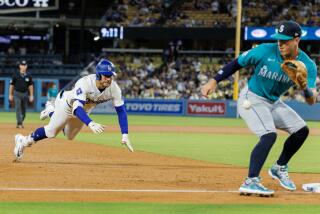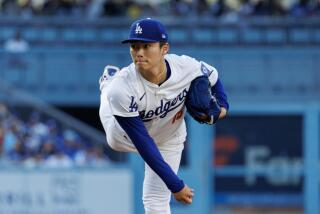Griffey and Buhner Give Till It Helps
- Share via
PEORIA, Ariz. — A powerful offense and rebuilt rotation are only two measures of the Seattle Mariners’ evolution into a World Series-caliber team.
“Now you’ve got a team of guys who want to come [to Seattle] to play and guys who want to stay here, and that’s definitely not the way it’s always been with the Mariners,” said Ken Griffey Jr., who at 27 is already approaching his eighth major league season. “Guys know we have a committed ownership now and contending team.”
In addition, Griffey said, “You’ve got
some veteran guys willing to defer money to help ownership sign other guys.
“And if [ownership] needs more, I think we’d be willing to do more.”
That’s an illustration, said Seattle right fielder Jay Buhner, that loyalty can be a two-way street.
Not that deferring salary is a new concept. Many players do it--seeking security and a hedge against taxes.
In Seattle’s case, however, Griffey and Buhner are deferring significant chunks of salary until the club’s revenue stream improves in a new ballpark, scheduled to open in 1999, and to help sign the one or two key players “who might take us to the next level,” Buhner said.
“I mean, the Mariners were known in the past for giving away enough great talent to comprise an All-Star team. Guys either left in their prime or came to Seattle at the end of their careers. Now we have a great blend of veterans and youth, and ownership is locking up young players with multiyear deals. It’s not a new concept for Cleveland and other teams, but it is for Seattle. The revolving door is a thing of the past.”
And if Buhner can contribute to the process by deferring salary?
“If it helps lock up or bring in a player, it boils down to winning,” he said. “I mean, money isn’t a big issue with me. How much do you need to live on?”
Buhner is deferring $2.3 million this year and $3 million in each of the next two years, when his two-year, $13-million extension kicks in.
Griffey is deferring $1.25 million in each year of a four-year, $34-million extension starting this year. Griffey did it to help keep good friend Buhner in Seattle with that two-year extension.
The question, of course, is why would a team whose majority owners are executives of multinational Nintendo need financial assistance from its employees?
The basic answer seems to be that a budget is a budget, and the Mariner payroll, once among baseball’s lowest, has crept to about $38 million, putting it in the top half of baseball’s payrolls.
“You can’t point to one specific player and say the deferred money permitted us to sign him, but it has a cumulative effect and benefits cash flow and flexibility,” said Lee Pelekoudas, assistant general manager.
“You have to be selective and do it [deferring salary] for the right reason or it can put you in a box down the road. I mean, at some point, you still have to pay it.”
Buhner and Griffey became convinced of ownership’s commitment in 1995, the year of the franchise’s renaissance, when management made late-season deals for the first time, bringing in Andy Benes and Vince Coleman among others, to help fuel the division title run. Last season, as the Mariners rallied again and almost caught the Texas Rangers in the American League West, management made second-half deals for pitchers Jamie Moyer and Terry Mulholland to help rebuild an injury-riddled rotation.
And last winter, Moyer was re-signed for two years at $3.4 million; left-hander Jeff Fassero was acquired from Montreal and signed to a three-year, $14-million contract, and Alex Rodriguez, the club’s sensational young shortstop, received a four-year, $10.4-million contract.
How much Griffey and Buhner contributed to those signings with their deferred salary is difficult to pinpoint. They might not have given until it hurt, but it definitely seems to have helped.
MARINER KEYS
With a fearsome lineup featuring Rodriguez, Griffey, Buhner and Edgar Martinez, the Mariners led the majors in runs last year but were also among the leaders in runs allowed. The rotation went under when Cy Young Award winner Randy Johnson suffered a herniated disk. He made his last start May 12 and ultimately had surgery Sept. 12.
Johnson has described his comeback as an emotional roller coaster that at times threatened his marriage. He has been arrogant and churlish with reporters, telling one Seattle writer that “talking to me is a right and I’m withdrawing that right in your case.”
He was also shaken by the Tuesday incident in which J.T. Snow of the San Francisco Giants suffered a broken left eye orbit when hit by one of his pitches. But he seems on course to regain his role as ace and intimidator of a vastly improved rotation that includes Moyer, Fassero, former San Diego right-hander Scott Sanders and possibly Dennis Martinez, seeking a comeback at 41.
“Everybody knows we’re a good offensive team,” Griffey said. “Now it’s a matter of balancing it out. You can’t win every game with offense. You have to win with defense and pitching. Hopefully, we’re in a better position now to balance the gap [between the offense and pitching].”
If Martinez stays, the Mariner staff will include three pitchers who have totaled 20 opening-day assignments--Johnson and Fassero being the other two. Manager Lou Piniella said his team is at a point in terms of maturation “where a team should be when it thinks it’s ready to win.”
“I like the chemistry and toughness,” he said, adding the Mariners are a “heavyweight” compared to the 1990 Cincinnati Reds, a team he guided to a World Series sweep over the Oakland Athletics. Oddsmakers and others are saying this Piniella team should also be playing in October. Pressure?
“I think our players have enough experience that they’re over the press-clipping syndrome,” Piniella said. “Besides, would you rather be part of a team that has a chance to win, or one that’s picked to finish last?”
HECK WITH HIDEKI?
That’s pretty much the attitude of San Diego Padre players, who realize that Hideki Irabu, the coveted Japanese pitcher, would be a valuable addition but know he will probably end up with the New York Yankees and are tiring of the endless distraction.
“He wasn’t here last year when we won, so we can’t worry about it,” Tony Gwynn said. “Everybody says he can pitch, but the bottom line is . . . that he has zero major league experience. Until he goes out and does it, it’s just all talk.
“We’d like to have him, but whether that happens or not, we just have to go about our business.”
AND . . .
--Agent Don Nomura and union leader Donald Fehr insist they will take legal action against baseball aimed at making Irabu a free agent if he isn’t traded to the Yankees by midweek, but the Padres are contemplating a suit against Nomura and the Yankees for tampering and acting in concert to prevent Irabu’s signing with the Padres or any other team to which they might trade him.
--If rookie Jose Cruz Jr. opens in left field for the Mariners, he will be the 47th left fielder Griffey has played with in seven-plus seasons and the third first-round draft choice in the starting lineup--joining Griffey and Rodriguez.
--It will take a week before the swelling is down sufficiently to determine if Snow, the former Angel and now Giant first baseman, will require surgery or if there was damage to the left eye caused by the harrowing encounter with a Johnson fastball.
“There’s a fear that with some fractures it pulls the tissue with it, which requires surgery,” San Francisco trainer Mark Letendre said.
Snow will be sidelined at least a month, and the Giants will replace him by committee, Manager Dusty Baker indicated, with Jeff Kent moving from second or Stan Javier from the outfield or nonroster player David McCarty getting a shot.
More to Read
Go beyond the scoreboard
Get the latest on L.A.'s teams in the daily Sports Report newsletter.
You may occasionally receive promotional content from the Los Angeles Times.










